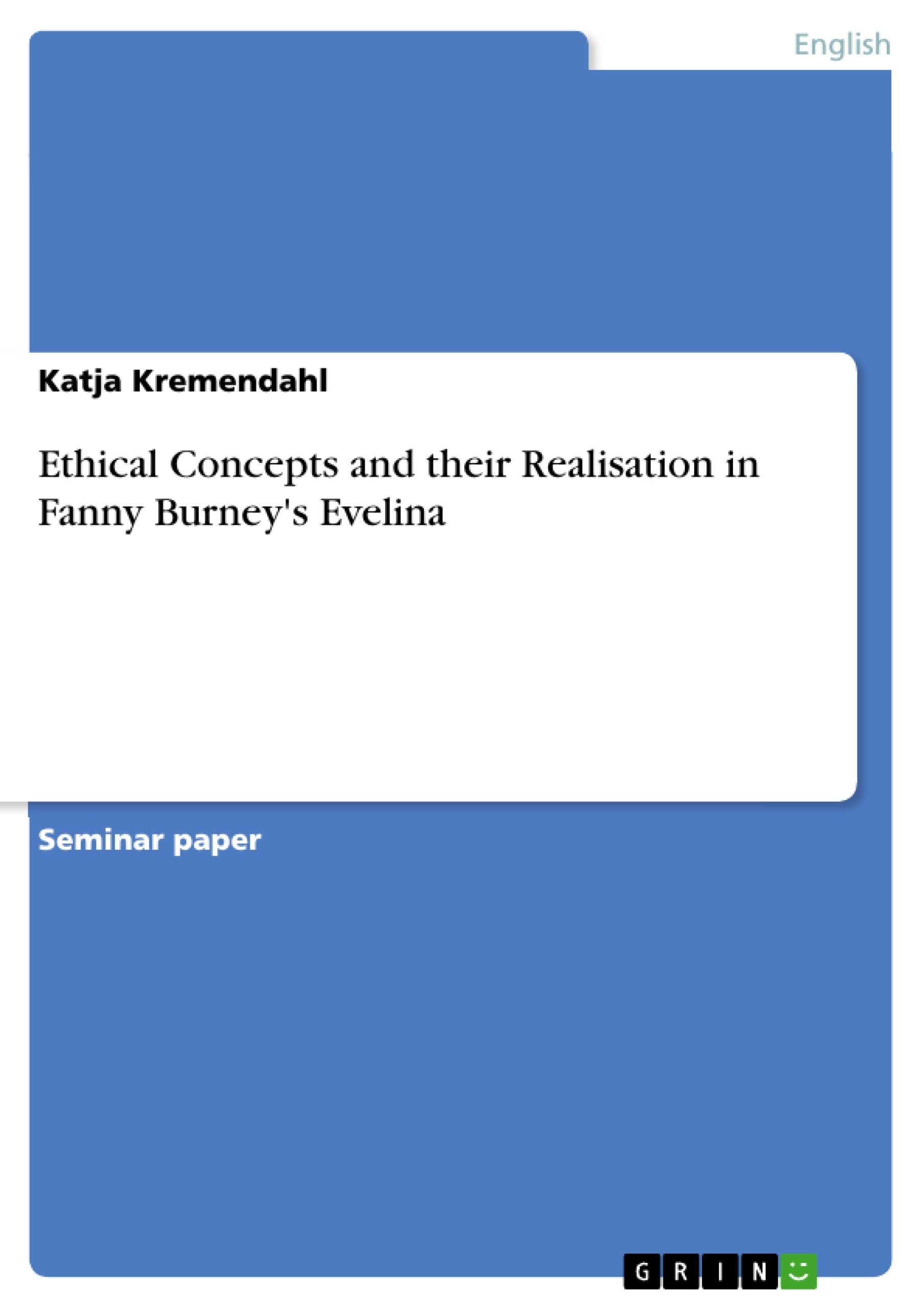Literary works can hardly ever be separated from the ethical concepts of the time. This is even more the case for the 18thcentury novel, which as a genre appeared at the beginning of that century.1The social-historic and economic changes, the consequently following rise of the middle class and radical alteration of the patronage system can be held responsible for the prevailing conditions of a more realistic approach to prose works. While Clive T. Probyn calls the time after the epoch of the “big four” the “novelistic vacuum”4Joyce Tompkins even goes so far as to say that whereas the quantity of the output rose the quality decreased. But although many critics make disparaging remarks about the authors of the period between the fathers of the novel and the generation of Austen, Scott and others - to neglect the last quarter of the 18thcentury and its writers would be a terrible mistake. There were writers, called the “transitional novelists” by Lilian D. and Edward Bloom whose main goals were to imitate their idols, to mix the existing types of novels and integrate other (also foreign) influences. These authors included among others Fanny Burney and Maria Edgeworth, who were and are recognised for not only imitating but also for having invented a new type.
Generally speaking the authors of 18thcentury novels knew that they, more than merely entertaining their readership, had to invent heroes and heroines who were supposed to offer an ethical and moral pattern.9In this paper, after having established a common ground of the fundamental concepts of the 18thcentury, these aspects will be examined in Fanny Burney’s Evelina. First of all it has to be shown what kind of process of education the heroine goes through and why. But equally important it will be in which way the novel masters its didactic task towards educating the 18thcentury reader. In the following these two features will be discussed with the help of references to Fanny Burney’s life as well as examples from the novel itself.
Inhaltsverzeichnis (Table of Contents)
- Introduction
- Background to 18th century literature and general definitions
- The concept of ethics
- The rise of the novel
- Mothers of the novel or female writing
- Ethical concepts and their realisation in Evelina
- Fanny Burney's moral values and understanding
- Philosophical influences in Evelina
- Realisation of ethical concepts in a novel of initiation
- The influence of conduct books
- The concept of virtue
- The concept of prudence
- Interactivity of narrative technique and moral intention
- Narrative perspective
- Narrative structure
- Conclusion
Zielsetzung und Themenschwerpunkte (Objectives and Key Themes)
This paper aims to explore the ethical concepts present in Fanny Burney's Evelina. It focuses on how the novel, through its narrative structure and character development, exemplifies the moral and ethical values of the 18th century.
- The role of ethics in 18th-century literature
- The concept of virtue and its realization in the novel
- The influence of conduct books on female education and social behavior
- The interrelationship of narrative technique and moral intention in Evelina
- Fanny Burney's contribution to the development of the female Bildungsroman
Zusammenfassung der Kapitel (Chapter Summaries)
The introduction establishes the context of 18th-century literature, highlighting the social and historical factors that contributed to the rise of the novel. It further discusses the role of ethics and morality in shaping literary works of the period.
The second chapter delves into the concept of ethics in the 18th century, examining the philosophical influences of Rousseau, Shaftesbury, and Hume. It explores how these thinkers shaped the prevailing ideas about human nature, virtue, and morality.
Chapter three focuses on the ethical concepts present in Fanny Burney's Evelina. It analyzes Burney's moral values and understanding, highlighting her use of conduct books as a means of shaping the heroine's moral education. The chapter also explores the concept of virtue and prudence as embodied in the novel.
Chapter four investigates the relationship between narrative technique and moral intention in Evelina. It examines the role of narrative perspective and structure in conveying the novel's ethical message.
Schlüsselwörter (Keywords)
Key terms and concepts explored in this paper include: 18th-century ethics, moral philosophy, virtue, prudence, conduct books, female education, Bildungsroman, narrative technique, and Fanny Burney.
Frequently Asked Questions
What is the central theme of Fanny Burney's "Evelina"?
The novel focuses on the moral and ethical education of its heroine, serving as an example of an 18th-century "novel of initiation" or Bildungsroman.
How did 18th-century ethics influence the novel?
The work was shaped by philosophical influences such as Rousseau, Hume, and Shaftesbury, emphasizing concepts like virtue and prudence.
What was the role of conduct books in "Evelina"?
Conduct books influenced the didactic task of the novel by providing patterns for female education and proper social behavior.
Who are the "transitional novelists"?
This term refers to writers like Fanny Burney and Maria Edgeworth, who bridged the gap between the early fathers of the novel and later giants like Austen and Scott.
How does the narrative technique support the moral intention?
The epistolary structure and narrative perspective allow the reader to follow Evelina's internal moral development and learning process closely.
- Citar trabajo
- Diplom-Kauffrau Katja Kremendahl (Autor), 2006, Ethical Concepts and their Realisation in Fanny Burney's Evelina, Múnich, GRIN Verlag, https://www.grin.com/document/65131



